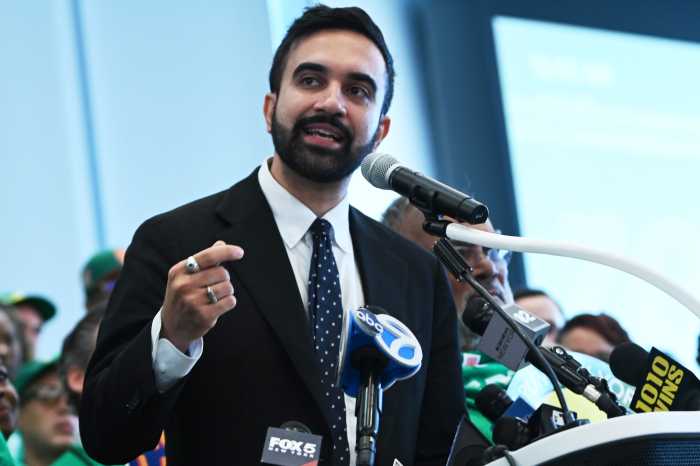Narrow ruling by trial court accompanied by overheated rhetoric
A Livingston County Supreme Court judge has declined to throw out a lawsuit challenging the Marriage Equality Act signed by Governor Andrew Cuomo in June.
In a ruling dated November 18 but released on November 29, Acting Judge Robert B. Wiggins found that “sufficient facts” were not yet before the court regarding the claim by New Yorkers for Constitutional Freedoms (NYCF) –– an anti-gay group that aims “to influence legislation and legislators for the Lord Jesus Christ” –– that the state’s Open Meetings Law had been violated.
Wiggins dismissed the rest of NYCF’s claims, including its allegation that the requirement that bills be printed and on legislators’ desks three days prior to a vote had also been ignored. Nevertheless, the judge termed the explanation Cuomo provided in his certification that the waiting period should be waived “disingenuous.”
In concluding the Open Meetings Law matter required that further evidence be considered, Wiggins noted that the State Constitution requires that public business be conducted in public unless “the public welfare requires secrecy.” The alleged violation, according to the ruling, involved a meeting of the Republican caucus, the body that made the decision to allow a floor vote on the marriage bill.
The judge found that an Open Meetings Law exception for “executive sessions” did not apply here, but addressed the possibility that a carve-out for meetings among members of the same political party might be applicable.
The meeting under dispute, however, also included a presentation by Cuomo, a Democrat, to the Republican senators. The state argued that the governor appeared as a guest of the senators, but NYCF alleged that the presence of a Democratic governor at a gathering of GOP legislators precluded the meeting from qualifying for the party caucus exception to the open meetings requirement.
Wiggins may have tipped his hand when he wrote that the NYCF alleged circumstances “very similar” to a 2006 case, Warren v. Giambra, where a meeting between eight Erie County Democratic legislators and the Republican County Executive did not qualify for an exception.
It is worth noting that the 2006 case Wiggins cited involved negotiations over whether the county would ask the state for authority to raise taxes to fill a budget gap. Justice John P. Lane found that some meetings were held in violation of the Open Meetings Law and that he had authority to declare actions based on such meetings void.
Lane, however, also wrote that the Court of Appeals, the state's highest bench, has ruled that “not every breach of the 'Open Meetings Law' automatically triggers its enforcement sanctions.” He concluded that “a sanction generally is not warranted” unless there is a “persistent pattern of deliberate violation of the letter and spirit of the Open Meetings Law by a public body.” Lane did not issue an injunction against the budget adopted by the Erie County Legislature, explaining, “In the absence of aggravating factors, the courts of New York do not routinely award injunctive relief and impose sanctions for nonprejudicial violations of the Open Meetings Law.”
In concluding his ruling, Wiggins wrote, “There are not sufficient facts before the Court to determine the matter; thus, the case shall proceed on this issue. The complaint is dismissed on other issues.”
Despite dismissing the other issues, Wiggins did not hold back on his rhetoric in discussing them. He acknowledged that the Senate accepted Cuomo’s certification that immediate action on the marriage bill –– rather than a three-day wait ––was required given the critical rights denied same-sex couples without its enactment, while terming the governor’s explanation “disingenuous.”
The judge also wrote that the state’s brief in the case “spews sanctimonious verbiage on the separation of powers” even as “clear arm-twisting by the Executive on the Legislative permeates this entire process.”
CapitolTonight.com reported that the governor’s office reiterated its view that the NYCF challenge is without merit.
Liberty Counsel, an anti-gay litigation group representing NYCF, termed the Wiggins ruling “a major setback” to the Marriage Equality Act.
The State Supreme Court is the trial level bench of the New York judiciary, whose rulings can be appealed to the Appellate Division and, ultimately, the Court of Appeals. –– Additional reporting by Arthur S. Leonard.


































